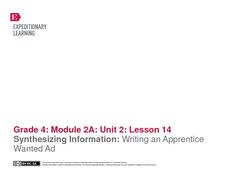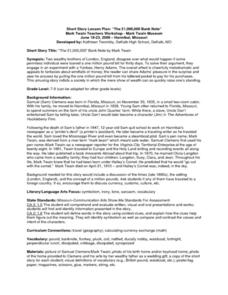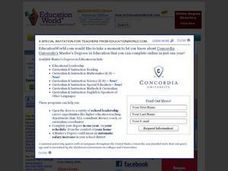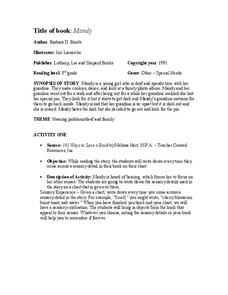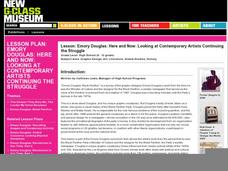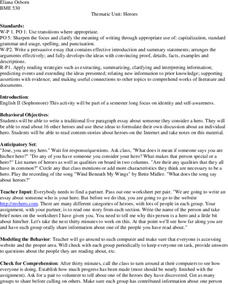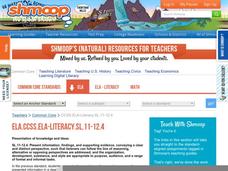Polk Bros Foundation
Answer the BIG Question with Cited Examples and Evidence
Close up your unit of study with an examination of one of the guiding or essential questions as it relates to what your class has studied and other research. Class members first write down the question. Then they note down information...
Curated OER
Reading Examples
Young writers read excerpts from Gary Paulsen's memoir to identify figurative and literal language that contain sensory details. They determine which selections are examples of sensory language and fi the language is used literally or...
Curated OER
Using Details From The Text
Begin this expository writing activity by reading a non-fiction book of your choice and modeling expository writing. The plan suggests The Trip of a Drip by Vicki Cobb but notes that other texts will work. Learners then choose a...
Curated OER
A Seashell Lesson: Writing for Detail and the Scientific Process
Practice descriptive language in this lesson, which prompts elementary and middle schoolers to write detailed descriptive sentences describing a seashell. They write a description of a shell, create an illustration, and other students...
EngageNY
Synthesizing Information: Writing an Apprentice Wanted Ad
Fourth graders view examples of help-wanted ads as they plan and create their own writing in the fourteenth instructional activity of this unit on colonial trade. The engagement of the class is captured when the teacher shares an actual...
Curated OER
"The 1,000,000 Pound Bank Note" by Mark Twain
Compare real events from Mark Twain's life to events in the story. Middle school readers identify point-of-view, its purpose, and its reliability by citing two examples. They describe the tone of the story using four examples and...
Curated OER
Let's Get it Together! Reading to Learn
Let’s learn about frogs! Young readers are led through “Freaky Frogs,” a non-fiction article. Teach learners how to edit an article so there are fewer details to sift through. After talking through the article, they learn the six steps...
Curated OER
Note Taking By Crayon
Skim a brief biography of Amelia Earhart with your class, and then assign groups of researchers one of four topics listed: Amelia's family life, important airplane flights during Amelia's life, turning points in Amelia's life, and...
Scholastic
Outlining Main Ideas and Details
Practice outlining and evaluating expository writing in this lesson. After discussing main ideas and seeing examples, young writers go through a sample outline and discuss the way to properly format a piece of writing. They then create...
Curated OER
Narrative Nuts and Bolts
After viewing slides and reading about child labor, young authors compose an original narrative story. They practice note-taking skills and work to effectively engage a reader by incorporating plot, logical order, complex characters,...
Curated OER
Listening To a Guest Speaker
Pupils review the main points of note-taking to summarize the content of a formal or informal spoken presentation. They hear a guest speaker talk about a pre-arranged topic and take notes during the presentation. Next, they write a...
EngageNY
Grade 10 ELA Module 3: Unit 2, Lesson 4
Scholars take a close look at evaluating sources and the information that comes from them. Learners review their research plans, use a handout organizer to learn how to take notes, and begin annotating correctly. They practice what they...
Curated OER
Information Shuffle
Gather some information, print it onto sentence strips, and then have your class physically shuffle the cards to better understand the importance of organizational patterns in writing. Middle school learners examine information for a...
Curated OER
Plagiarism Workshop
What do George Harrison, Vanilla Ice, and Steven Ambrose all have in common? The Warner Brothers’ films Batman Forever and The Devil’s Advocate? All are guilty of plagiarism. And if you are considering a research project and want to...
Curated OER
3R Activity (Reading-Relating-Responding)
Students read for detail. In this reading comprehension lesson, students read a passage and share their thoughts with a small group. Students reflect upon the passage and develop an oral summary of the text.
California Polytechnic State University
Australian Geography Unit
At the heart of this resource is a beautifully detailed PowerPoint presentation (provided in PDF form) on the overall physical geography of Australia, basic facts about the country, Aboriginal history, and Australia culture and lifestyle.
American Physiological Society
Why is Kettle Corn Cooked in Copper Pots?
The kitchen — it's not just for eating anymore! Specific heat is often a difficult concept to grasp, so give it context by relating it to cooking. Learners gain experience in the principles of thermal energy transfer by designing an...
Curated OER
Mandy
Third graders read Barbara D. Booth's, "Mandy" while noting each time they read a sensory detail. They read about the young girl in the story who is hard of hearing and determine how her other senses are heightened. Also, they determine...
Curated OER
Understanding Story Elements-Who, What, Where
Students create a rap using story details. In this creative writing lesson, students examine the use of rap lyrics to list important details of stories. They view a video example, and use their notes to create their own raps...
Curated OER
Using Details from Text to Identify Author's Purpose
Explore writing techniques by analyzing newspapers and magazines with middle schoolers. They will collaborate in small groups to read local news stories and identify the main ideas and author's intent. They also utilize an information...
Curated OER
Lesson: Emory Douglas: Here and Now: Looking at Contemporary Struggle
After looking into the life, art, and social contributions of artist Emory Douglas, learners analyze several social art pieces. They use Emory Douglas as an example of social art, then consider 10 other pieces. They write a paper...
Carolina K-12
African Americans in the United States Congress During Reconstruction
The Civil Rights Act of 1866, which granted citizenship to all males in the U.S., resulted in the first African Americans to be elected to Congress. Class members research 11 of these men, the challenges they faced, and craft...
Curated OER
Heroes
Tenth graders participate in research and class discussion before attempting to write a traditional five paragraph essay. They use the examples of 16 other hero stories to consider. Students use examples and descriptive details to...
Shmoop
ELA.CCSS.ELA-Literacy.SL.11-12.4
Study allusions with a research and presentation project. Pupils are assigned a specific allusion, the phoenix for example. They research the origins, compose a summary, explain the concept, and explore this allusion within various...






